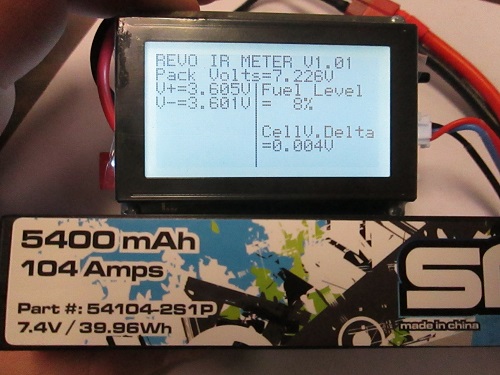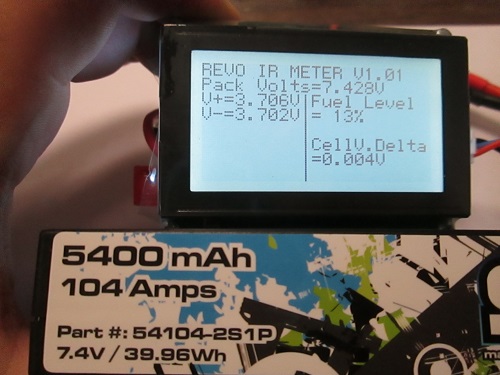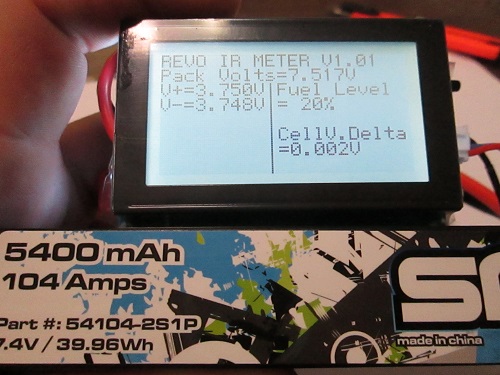LVC Adjustments and Packs in Series
With more and more RTR kits coming out that require 2
packs to be run in series I thought it’s time to give some info regarding these
setups. Running 2 packs in series is not a good setup and is used because it’s
more convenient as it’s easier to get purchase lower voltage packs and put them
in series. The reason why this setup isn’t very good is because the packs will
discharge down to different levels. This is due to the flow of current, the
current from one pack must flow ‘through’ the second pack meaning that the
current sees virtually double the resistance of the first pack. As you read below about the ESC cutoff, the
pack with the highest resistance will drain the least. The ideal setup would be
to run 1 pack at the proper voltage instead of 2 packs in series to get the
desired voltage. This is why we offer 6S packs that fit in
the Arrma 2018 battery trays as Arrma allows the use of one
6S pack instead of two 3S packs.
If you
are running a Traxxas kit or other kit that doesn’t allow for one
pack to be used you need to make sure the low voltage cutoff (LVC) in
your ESC is set high enough for the lowest of the 2 packs to not have the cells
be discharged down to low. Discharging packs down too low under load will
decrease cycle life and increase the chance of cell damage. Once you have hit
the low voltage cutoff take the packs out and look at the cell
voltages. If they are below 3.6v per cell you need to increase
your cutoff. If your ESC doesn’t have an adjustable cutoff or
it’s already at the highest setting then you need to consider running a LiPo Alarm
which can be attached to the pack and connected to the packs balance connector.
An important aspect
of running 2 packs in series that is often overlooked is to swap the packs
every run. That is to have each pack run on the ESC negative lead and positive
lead alternatively. As mentioned above, one of the packs is basically solicited
twice as much as the other, by alternating which is seeing twice the work load
every run, you are using the packs equally. We recommend keeping packs in pairs
when used in series, and by marking each pair 1A-1B, 2A-2B, etc. it is easy to
keep track of which pack has been used on which ‘side’ every run.
If you are
running 2 packs in series and one gets damaged it’s best to replace both packs
as if you take a new pack and run it with one that has some cycles put through
it you will have an even greater difference in discharge between the packs. As
a pack gets cycled the mAh drops and the resistance will increase. A
new pack with higher mAh and lower resistance will not discharge down
as low as the older pack.
The low voltage cutoffs on ESCs aren’t very accurate as there are a few things that will impact when they will cutoff. The resistance of the pack and the rest of the system will have an impact on how much voltage drop the ESC will have. For example you have 2 different set of packs with the same mAh but one set has 7mOhms of resistance per cell and the other set has 1.8 mOhms of resistance per cell the set with the higher resistance will have more voltage drop under load. This means the cutoff will kick in earlier and the cells won’t be discharged down as low. If running packs in cool/cold weather they will cutoff earlier then running them in warm/hot weather as the packs resistance is higher when they are cool/cold. If you are running on a low traction surface like concrete or asphalt your packs will discharge down more before the cutoff kicks in. This is due to less amps being pulled so the voltage drop is less which means the packs will discharge more before the cutoff kicks in. The opposite is running in grass or sticky mud you will pull more amps and the voltage drop will be higher so you will discharge the pack down less. This is why it’s important to have your cutoff set and adjusted based on the conditions you run in. As mentioned above the best way to check and make sure your cutoff is cutting in at the proper level so your packs don’t get dis charged down to low is to check the cell voltages as soon as the cutoff kicks in you want the cells to be at 3.6v or above.



There are no products to list in this category.

